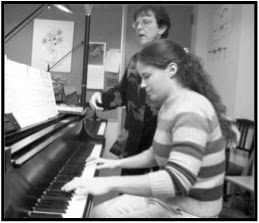Exposure - Many parents think that if their child has not expressed interest in the piano or in music, that they may not enjoy taking lessons. This usually is not true! One of the Mother Tongue Method steps discussed in the "Suzuki vs. Traditional" post is Imitation. If music is something that you believe would be good for your child, then start by showing interest in it yourself and exposing your child to it.
- Watch concerts on TV or go to them live,
- Buy the instrument you'd like your child to play and start learning to play it,
- Take your child to watch other children's lessons,
Find a Teacher - If the Suzuki Method is something you may be interested in then you can go to http://suzukiassociation.org/teachers/teacherloc/ to find a teacher in your area. If you think a traditional approach would better suit you and your child, then you may be able to ask your child's school music teacher or contact a nearby college's music department. And, of course, you can contact me!
Start Listening - This goes along with exposure, but if you've chosen to use the Suzuki Method then it is never too early to start listening to the CD. You can ask any Suzuki family with multiple children and they'll agree that the younger children excel because of the extra listening they've been exposed to from their older siblings. Ask your teacher for a CD even before you schedule your first lesson.
Obtain an Instrument - Of course this depends on what instrument you have chosen for your child to study. Local music shops typically offer rental programs for many instruments, but check with your teacher before renting one to make sure it's the right size. A rental will probably be difficult to find for a piano, but you can look online, in the paper, or ask family members if they have a piano they're not using. Beginner students can start learning on a keyboard, but I encourage families to invest in a real piano at some point. Having a quality instrument for your child to play will also encourage them.
Observe Lessons - This a completely free way to get to know a teacher and learn a little bit about what you'll be doing. Children learn very well when immersed in a
musical environment. You can also learn how lessons progress and
what your role is as a parent.
 |
| Blake plays while his Mom and sisters observe |
Schedule a lesson - You
will need to think about when is best for your child to have a lesson. Young
children do not typically learn well late at night or during nap time and older children may do better if their lessons are not the same day as other activities.
Parent Lessons - I typically ask that new parents participate in four parent lessons before their child begins lessons. These provide you with the necessary tools you
will need to help your child succeed at home. We discuss things such as:
- The Suzuki Philosophy,
- Proper posture and technique,
- Developing good practice habits,
- Creating a positive learning environment,
- Your role as a parent.
- The Suzuki Philosophy,
- Proper posture and technique,
- Developing good practice habits,
- Creating a positive learning environment,
- Your role as a parent.
I hope these steps make it seem easier to get your child started. If you have any questions about starting your child you can always contact me, Sandra Leary, at dunkirksuzuki@gmail.com, or call (716)270-7117.



